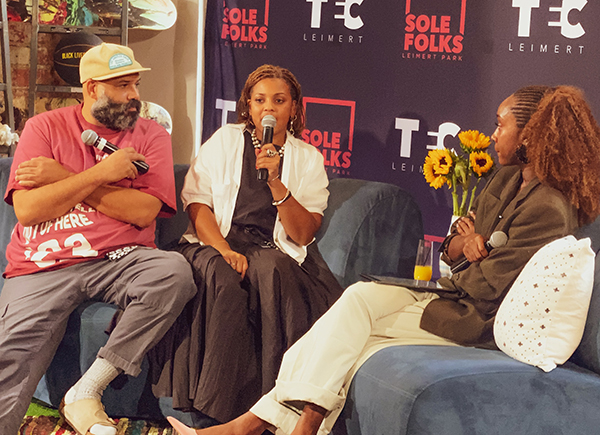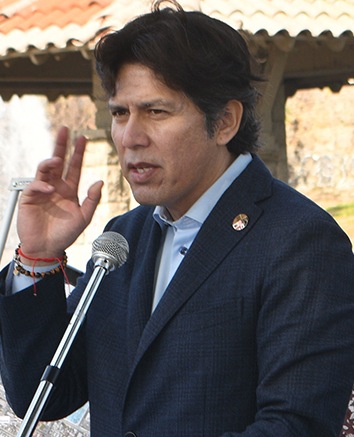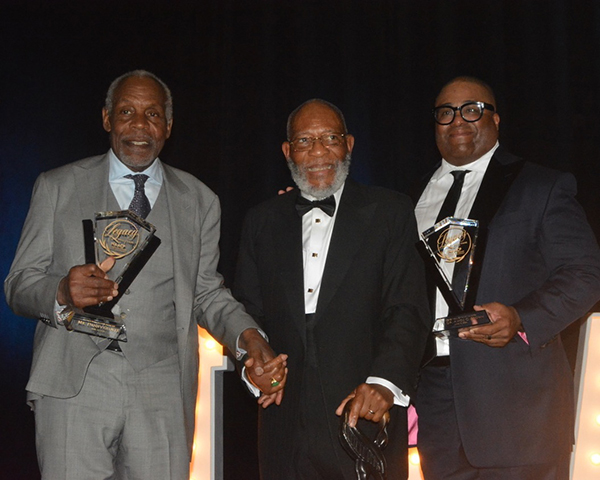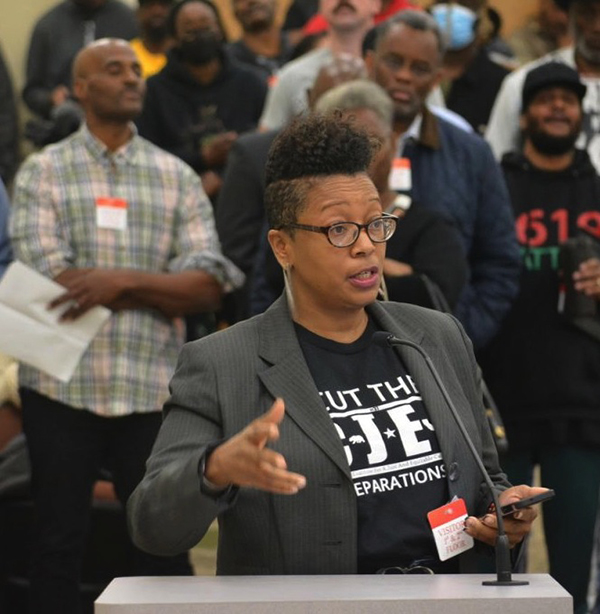By Shirley Hawkins
Contributing Writer
LEIMERT PARK — Technology is exploding around the world, and Los Angeles is emerging as one of the major cities that is galvanizing the tech industry.
African Americans have long been recognized for influencing the trends in cutting-edge technology that reaches around the globe, whether the trends are in the gaming, music, television, film or fashion.
The Technology Entertainment Convergence, or TEC Leimert, is South Los Angeles’ largest Black-owned and operated annual technology and entertainment event that celebrates Black culture.
Held Sept. 25 in Leimert Park Village, the fourth annual conference was titled “Black to the Future” and attracted top industry executives, entrepreneurs and creatives who discussed the latest developments in the art and tech industry.
TEC Leimert’s goal is to produce programming to bridge the digital divide to support under-resourced communities by providing them with tools and information necessary to compete for digital career opportunities. During the event, dozens of young people eagerly flocked to talk to the speakers and gain more insight after their presentations.
“We are bringing industry leaders and influencers into Leimert Park to unpack career pathways in this emerging digital economy,” said Rashidi Jones, co-founder of TEC Leimert. “Confronting the digital divide needs to be a top priority in underserved communities and that’s why we started this conference in the heart of South Los Angeles.”
Panelists on “Gaming — the “B” Side tackled the billion-dollar video game industry where game streaming has exploded on platforms such as Twitch, YouTube and Facebook. Speakers included Joshua Parker of Riot Games, Eric Elder, founder of the XR Wizards Lab, Trinidad Hermida, founder of the Hermida Company, and moderator Charles Babb of Disney.
In less than seven years, 57% of video game players in the U.S. between the ages of 6 and 29 will be people of color, according to statistics, but the industry remains extraordinarily white despite the fact that Black Americans, who represent less than 2% of the gaming industry, are 71% more likely to be engaged gamers.
“The video game industry is the largest entertainment industry right now, but Blacks make up only 2% of the industry, even though we are among the largest consumers of video games,” Babb said, adding that there were major jumps in viewership in 2020 with gamers preferring to play video games over watching television or movies.
“Our goal is to not only get more of us into the video game studios, but to get us into positions to start our own studios.”
Hermida said her company’s mission is to “Build equity through empathy.”
“At the end of the day, there are multiple ways and opportunities to attain generational wealth in the game industry, especially for marginalized ethnicities and genders which you see on this panel represented today,” she said. “Right now, our biggest hurdle is awareness.
“When growing up, my parents never steered me towards gaming because they didn’t see a solid future for me and they didn’t want me to take the risk. Instead, I was steered towards law, medicine or education.
“We have to change the narrative. Let’s empower our communities not only to be consumers of the gaming market but also to be developers, designers, streamers, creators and leaders in industry.
“Finally, then we can influence and impact the future of gaming from the inside out.”
Babb said there is a keen interest in video games among Black and brown youth. He advised young people who want careers in the video game industry to download Unreal Engine or Unity 3D Engine on their computers and diligently practice building video games.
“To make a video game is easy, but to make a good video game is hard,” Babb said. “If you want to get into the video game industry, you don’t need to have an engineering degree, but it does help. You definitely must be able to program.”
Software engineer Parker said that several years ago he applied four times to Riot Games, one of the largest video game studios in the world.
“They said, ‘You’re good, but you’re not what we’re looking for,’” he said.
But Parker was undeterred. He studied the video game industry and steadily sharpened his skills.
“You must apply to these companies and then learn to be persistent,” said Parker, who was eventually hired by Riot Games in Santa Monica. He is now a gameplay engineer who works on the immensely popular League of Legends game that boasts 27 million players a day and is played in more than 145 countries.
City Councilman Mark Ridley-Thomas was one of the featured speakers on “The Future of Tech in L.A.” panel where he was joined by Austin Clements of Slauson & Co. an L.A.-based pre-seed and seed-stage venture firm that is focused on sustainable economic inclusion. Also on the panel were Albert Sanders, senior counsel at Google, and Cameron Onumah, public policy at Amazon Studios.
Ridley-Thomas said the need for inclusion and opportunities for South Los Angeles artists, creatives and entrepreneurs looking to compete in L.A.’s rapidly growing digital economy will increasingly define the future of technology in L.A.
“When we talk about the arts, technology and Afro-centric culture there is no other place like Leimert Park Village,” Ridley-Thomas said. “And with Los Angeles as the national hub for media, culture and technology, we must create more inclusivity and opportunity for communities of color, right here in our backyard. We must not just expose our community to the creative economy, but to propel them into well-paying and innovative career opportunities.”
Clements’ fund invests in founders from underrepresented backgrounds who are interested in entering the venture capital space. They lead investments on startups and small businesses run by Black and brown creators.
“We’re tapping into communities with tremendous talent that simply haven’t been given the opportunity and playbook to thrive,” Clements said. “We’re here to compete at the highest level and demonstrate that investing in underrepresented founders provides a competitive advantage.”
The next panel featured Talitha Watkins, president of Color Creative; Benoni Tagoe, president of Raedio and Rich Stevenson, head of Digital at Hoorae Media who gathered on the main stage to discuss Hoorae, founded by actress/writer/director Issa Rae. They discussed their plans to help grow the production company, which was launched by Rae in September 2020, to consolidate her various film, television and digital content companies.
Last March, Rae signed a five-year, $40 million deal that gives exclusive television rights to HBO, HBO Max and Warner Brothers. Some of her projects include her series “Insecure” and “A Black Lady Sketch Show.”
The moderator for the discussion was Ellene Miles of Sony Pictures.
“We want to go to the moon. We want to be the next media conglomerate,” said Tagoe, who is heavily involved in creating music and beats for Rae’s various productions. “I would like us to be the next major label. We all have tunnel vision and we want to make Hoorae as big as possible.”
Stevenson added that reaching out to the community and fans was an extremely important part of growing Hoorae. “We want to concentrate on building community and the possible ripples around that,” he said.
All three employees praised Rae, who they agree possesses an incredible work ethic.
“We are interested in people joining the company who match the energy of our CEO. That’s one thing, you’re not going to outwork her,” Watkins said.
Describing himself as a serial entrepreneur, Tagoe said he tried various professions. He finally found his niche in music and said he is eager to propel Hoorae into a musical juggernaut.
“One thing is that Insecure was popular for the music,” said Tagoe. “I want us to be the company that is programming the beats (for Hoorae).”
Tagoe said that the audience should not be afraid to try different things.
“You just have to go out there and try stuff,” said Tagoe. “Some will work and some will not. You just have to keep trying.”
Shirley Hawkins is a freelance reporter for Wave Newspapers. She can be reached at metropressnews@gmail.com.













